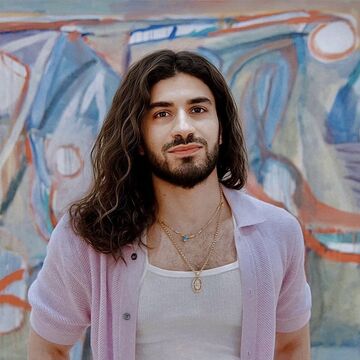

Elia Khalaf
Assistant Professor
Contact
Bio
Elia Khalaf (he/they) is a board-certified art therapist, psychotherapist, artist, and educator. As an Arab-American, non-binary immigrant, Khalaf positions their practice and research at the intersections of wellness and social justice, Eastern wisdom and Western science, and art and mental health. They are a PhD candidate in Counseling Education and Supervision at Oregon State University. Khalaf earned their MA in Art Therapy with a focus on clinical psychology at New York University. They apply a variety of tools including art therapies, mindfulness, somatic practices, nature-based therapy, and EMDR to support BIPOC and LGBTQIA+ communities and empower emerging therapists.
Personal Statement
I have always been interested in intersections and liminal spaces: the in-between area of the Venn diagram, the middle-ground in our thoughts, and the ambivalence in human emotion. As a non-binary, Arab immigrant, I know wellness and social justice are two interconnected areas and I position my work at the intersection of Western science and Eastern wisdom, rooted in a cross-cultural understanding. As an artist-art therapist, I am deeply interested in utilizing expressive arts in mental health treatment as both verbal and non-verbal tools which help develop an equitable therapeutic space for people from all cultural backgrounds. As an educator, supervisor, and scholar, I investigate individual experiences in larger systems.
As a counselor educator, I believe my passion is valuable since it is rooted in a deep interest in the subject. It is evident to me that educators must strive continually for multicultural awareness. Diversity in our learning environments should reflect cultural dimensions such as ethnicity, class, sexual orientation, gender, and disability. As a non-binary, Arab immigrant, and first-generation student, I appreciate first-hand the importance of inclusion in education.
In sum, I strive to support counseling students at the graduate level as they prepare to enter the field of healthcare and impact its outlook on diversity. Counseling students should be equipped with tools to deal with a rapidly changing landscape and combat compassion fatigue in response to various societal, technological, and professional challenges. I aim to empower students as they adapt to integration of digital techniques and telehealth practices, social justice issues, climate change and global crises, and evolving theories.
Awards
- Greenhouse Lab, Trauma Informed Techniques for Educators. Funded by O, Miami (2023).
- Infinite Seasons. Funded by the Knight Foundation through the Existent Books Initiative (2021).
- This Writing Well. Funded by O, Miami (2021).
- Blooming Names. Funded by O, Miami (2020).
- Blooming Bodies. Funded by O, Miami and Awesome Miami Foundation (2018).
- Side by Side. Funded by WaveMaker Award from Locust Projects and the Andy Warhol Foundation for the Visual Arts' Regional Regranting Program (2018).
- Not My Neim. Funded by O, Miami (2017).
- Brooklyn Public Library ProjectArt Fellowship (2017 – 2018).
- HaikU Road Signs. Funded by O, Miami, Exile Books, Lowe Art Museum, and the Ringling Museum (2017).
- Made-Up Memories. Funded by the Awesome Foundation. (2016).
- New York University Scholarship Award (2017–2019).
Publications
Work In Progress:
- Khalaf, E. and Dykeman, C. A Corpus-Based Study of Patient-Doctor Roles in Cancer Memoires.
- Khalaf, E. and Dykeman, C. A Corpus Driven Approach to Sentiment Analysis of Poetry Writing by Physicians and Patients.
Working Papers:
- Khalaf, E. Making Pillows: An Art Therapy Case Study in a Homeless Shelter. Under review, The Arts in Psychotherapy.
- Khalaf, E. “Blooming Names” Community Art Therapy: Flower Altars Honoring Black Lives and Coping with Grief.
Book Chapter:
- Scarce, J., Khalaf, E., Ballestas, A., Weinaple, D., Linton, J, and Wilson, C. (2021). Art Therapists Respond to COVID-19: Viewing Art Therapy in a New Virtual World, Self Care in a Pandemic. In Scarce, J. (Ed.), Art Therapy in Response to Natural Disaster, Mass Violence, and Crisis. Jessica Kingsley Publishers.
Other:
- Khalaf, E. (2018). My Name Isn’t Aaliyah—And It’s Definitely Not Alien. Help Me Reclaim My Name. Miami Herald. Op-ed.
Exhibitions
- Khalaf, E. Infinite Seasons. IS Projects. August 2024.
- The Greenhouse: Safe Communities Initiative. Summer 2022 and Summer 2023.
- Balfe, J., Barton, D., Clark-Jackson, Y., Cole, N., Daughtry, D.V., Duenas, P., Frith, L., Hoffman, A., Khalaf, E., Moise, E., Moreno, M., and Puig, J. (2023). I Am Me Resource Guide. The Adrienne Arsht Center for the Performing Arts of Miami-Dade County.
- Advancing Sickle Cell Advocacy Project Inc. August 2022–May 2023.
- Real Or Not So Much! (Group Exhibition). Escondido Arts Partnership Municipal Gallery. February 2022.
- The Writing Well Workshops. Zoom. March 24 and April 21, 2022.
- Into the Fold (Group Exhibition). Coral Springs Museum of Art. July 6–August 21, 2021.
- Blooming Names. Public Art and Flower-Based Art Therapy Workshops. Summer 2021.
- For the Love of Im-Possibilities (Student Exhibition). Rosenberg Gallery,
February 14–March 2, 2018. - MemoryLab (Group Exhibition). HistoryMiami Museum. March 9–April 16, 2017.
- Khalaf, E. (2017). Control. Exile Books.
- Khalaf, E. (2017). Memory Lab. HistoryMiami Museum.
- Khalaf, E. (2017). Stand-Up. Exile Books.
- Khalaf, E. (2017). Hurricane. Exile Books and IS Projects.
- Khalaf, E. (2016). A—Zines. Exile Books.
- Khalaf, E. (2015). The Unicycle Chronicles. Miami Ad School.
Presentations
- Art Therapy: Inclusive Mental Health Support for Diverse Populations in Oncology. The 19th American Psychosocial Oncology Society (APOS) Conference. Zoom. March 9–11, 2022. (Poster Session).
- Blooming Names. American Art Therapy Association (AATA) Annual Conference. San Diego, California. October 28–30, 2021.
- Art Therapists Respond to COVID-19: Viewing Art Therapy in a New Virtual World, Self-Care in a Pandemic. Florida State University (FSU)’s Art Therapy Programs’ Conference on Learning from COVID-19 Experience. Tallahassee, Florida, February 3–5, 2022.